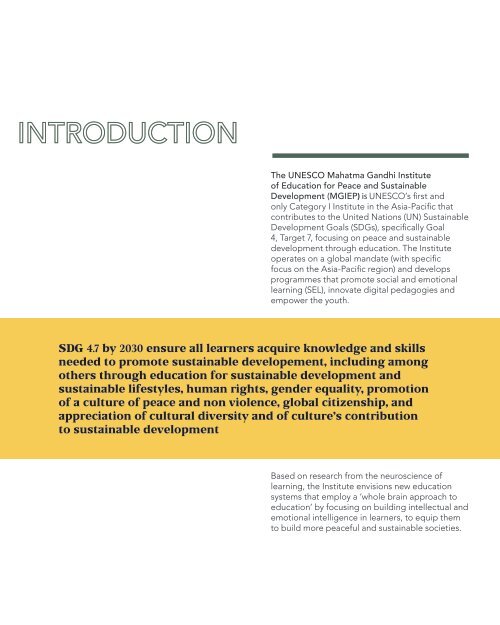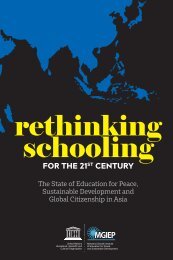UNESCO MGIEP's Annual Report 2019
2019 was a critical year for the Institute - with various products rolling out to pilot and implementation stage. Read the Institute's Mission-based Annual Report on the impact the Institute made during the year, as it works towards achieving the UN SDG 4, Target 7.
2019 was a critical year for the Institute - with various products rolling out to pilot and implementation stage. Read the Institute's Mission-based Annual Report on the impact the Institute made during the year, as it works towards achieving the UN SDG 4, Target 7.
Create successful ePaper yourself
Turn your PDF publications into a flip-book with our unique Google optimized e-Paper software.
ANNUAL REPORT <strong>2019</strong><br />
The <strong>UNESCO</strong> Mahatma Gandhi Institute<br />
of Education for Peace and Sustainable<br />
Development (MGIEP) is <strong>UNESCO</strong>’s first and<br />
only Category I Institute in the Asia-Pacific that<br />
contributes to the United Nations (UN) Sustainable<br />
Development Goals (SDGs), specifically Goal<br />
4, Target 7, focusing on peace and sustainable<br />
development through education. The Institute<br />
operates on a global mandate (with specific<br />
focus on the Asia-Pacific region) and develops<br />
programmes that promote social and emotional<br />
learning (SEL), innovate digital pedagogies and<br />
empower the youth.<br />
SDG 4.7 by 2030 ensure all learners acquire knowledge and skills<br />
needed to promote sustainable developement, including among<br />
others through education for sustainable development and<br />
sustainable lifestyles, human rights, gender equality, promotion<br />
of a culture of peace and non violence, global citizenship, and<br />
appreciation of cultural diversity and of culture’s contribution<br />
to sustainable development<br />
AN EVIDENCE<br />
BASED APPROACH<br />
<strong>UNESCO</strong> MGIEP embraces the power<br />
of technology to provide analytics and<br />
responsive Artificial<br />
Intelligence (AI) based digital pedagogies<br />
Based on research from the neuroscience of<br />
learning, the Institute envisions new education<br />
systems that employ a ‘whole brain approach to<br />
education’ by focusing on building intellectual and<br />
emotional intelligence in learners, to equip them<br />
to build more peaceful and sustainable societies.<br />
<strong>UNESCO</strong> MGIEP’s SEL interventions draw<br />
on the science of learning and aim to build<br />
intellectual and emotional intelligence among<br />
learners through innovative pedagogies.<br />
Recent advances in neuroscience research<br />
have demonstrated that human well-being<br />
requires a ‘whole brain’ approach, that is, the<br />
two parts of the human brain (the rational<br />
and the emotional) need to be trained and<br />
nurtured to ensure all round development of<br />
human beings. Based on this understanding,<br />
<strong>UNESCO</strong> MGIEP has developed a framework<br />
that builds four competencies in learners,<br />
including ‘Empathy’, ‘Mindfulness’, ‘Critical<br />
Inquiry’, and ‘Compassion’ (EMC 2 ). The<br />
Framework forms the basis of the various<br />
projects undertaken at the Institute. Further,<br />
<strong>UNESCO</strong> MGIEP embraces the power<br />
of technology to provide analytics and<br />
responsive Artificial Intelligence (AI) based<br />
digital pedagogies that are personalised,<br />
relevant, learner-driven, and transformative.


















